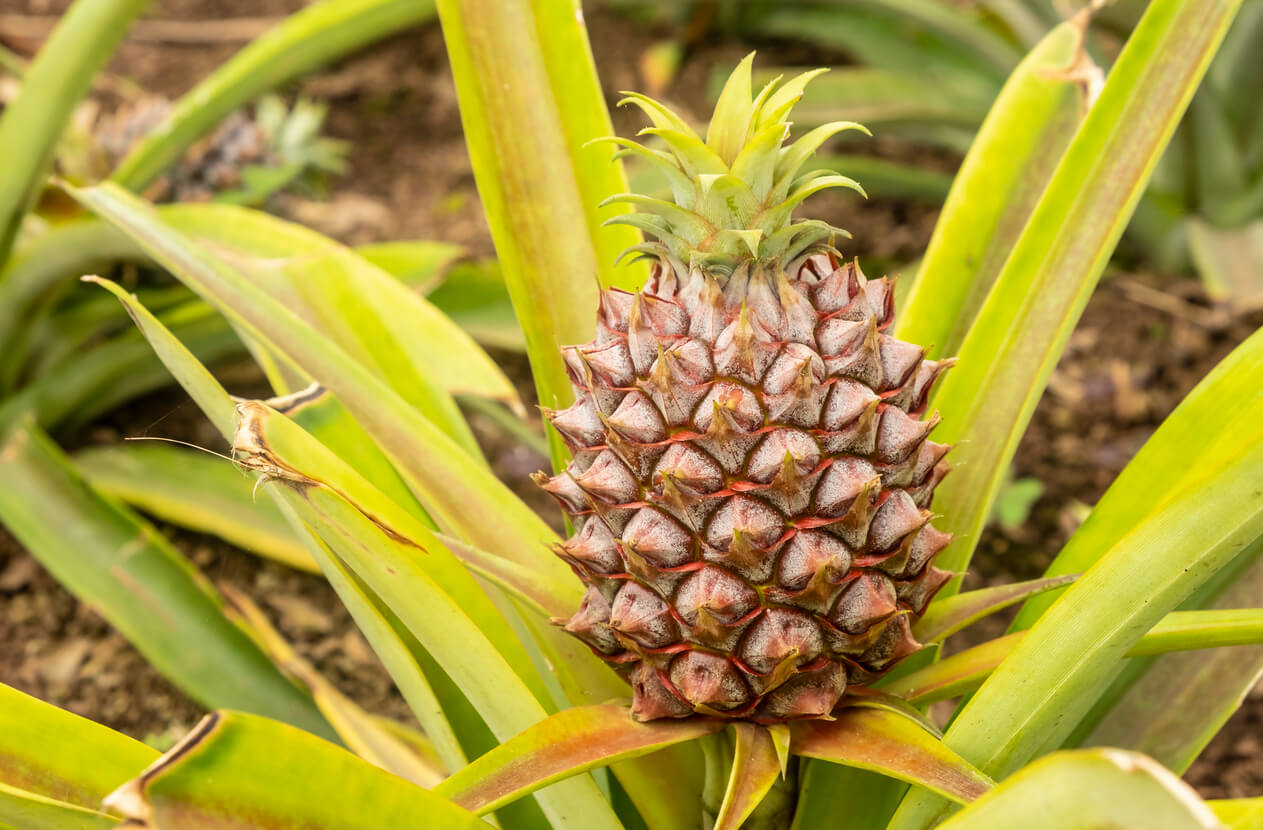Is It Good to Eat Pineapple During Pregnancy?


Written and verified by the nutritionist Saúl Sánchez Arias
Pineapples are a beneficial fruit for health. They contain essential nutrients as well as a series of compounds that facilitate digestion. In addition, they’re capable of providing antioxidants that are necessary in order to improve the functioning of the body. Now, we’re going to tell you if it’s really good to eat pineapple during pregnancy or if, during this period, you should avoid its consumption.
The truth is that, for many years, there were a series of myths that linked the intake of pineapple with certain adverse reactions in women who were pregnant. However, studies have found no evidence of harmful side effects from the consumption of this fruit.
The benefits of pineapple
Among the essential micronutrients contained in pineapple, vitamin C stands out. This element contributes to ensuring the proper functioning of the immune system, according to a study published in the journal Nutrients. Ensuring a regular intake of it reduces the incidence of infectious diseases, something that facilitates the gestation period.
On the other hand, it contains minerals that are important during pregnancy, as is the case of magnesium. This nutrient could reduce leg cramps in pregnant women, as evidenced by research published in the Canadian Journal of Kidney Health and Disease. However, it should be noted that some studies show contradictory results in this regard.
Also, the bromelain contained in pineapple improves the digestion of proteins, which reduces the likelihood of heartburn, reflux, and other gastrointestinal problems. This property is decisive, as pregnant women usually experience worse digestion due to the pressure of the uterus on the stomach and diaphragm.

Contraindications regarding pineapple during pregnancy
Despite the benefits mentioned above, it’s true that the consumption of pineapple during pregnancy could have a number of contraindications or risks. These are mainly based on the bromelain content. Apparently, this element could affect the cervix and increase the risk of premature births.
However, it should be noted that there’s no solid evidence to confirm this relationship. Moderate consumption of pineapple isn’t risky during pregnancy. In fact, this fruit has more benefits than dangers. For this reason, it can be included in a pregnant woman’s diet without fear.
Does pineapple cause contractions?
Some have also suggested that pineapple could cause uterine contractions. However, studies have shown that there’s no such relationship. Bromelain has no activating power on uterine smooth muscle or prostaglandin synthesis. For this reason, there’s no need to worry about possible abortifacient or labor-stimulating effects.
Only an excessive intake of pineapple during the early stages of pregnancy, when the maturation of the cervix is decisive for the health of the fetus, could be counterproductive. However, this is a very unlikely scenario, so in practice, there’s no reason to discourage the presence of this fruit in the diet of pregnant women.

It’s safe to eat pineapple during pregnancy
As mentioned above, pineapple can be consumed without risk during pregnancy. In moderate amounts, it won’t cause any harmful effects on the fetus. Moreover, it won’t increase the incidence of premature births or miscarriages. In fact, no cases of increased uterine contractions caused by bromelain have been reported in scientific literature. On the contrary, this fruit has several health-promoting benefits.
At the same time, don’t forget that it’s important to take care of your diet during pregnancy. Including undesirable foods in the diet could have negative consequences for the fetus. However, pineapple isn’t on this list.
Pineapples are a beneficial fruit for health. They contain essential nutrients as well as a series of compounds that facilitate digestion. In addition, they’re capable of providing antioxidants that are necessary in order to improve the functioning of the body. Now, we’re going to tell you if it’s really good to eat pineapple during pregnancy or if, during this period, you should avoid its consumption.
The truth is that, for many years, there were a series of myths that linked the intake of pineapple with certain adverse reactions in women who were pregnant. However, studies have found no evidence of harmful side effects from the consumption of this fruit.
The benefits of pineapple
Among the essential micronutrients contained in pineapple, vitamin C stands out. This element contributes to ensuring the proper functioning of the immune system, according to a study published in the journal Nutrients. Ensuring a regular intake of it reduces the incidence of infectious diseases, something that facilitates the gestation period.
On the other hand, it contains minerals that are important during pregnancy, as is the case of magnesium. This nutrient could reduce leg cramps in pregnant women, as evidenced by research published in the Canadian Journal of Kidney Health and Disease. However, it should be noted that some studies show contradictory results in this regard.
Also, the bromelain contained in pineapple improves the digestion of proteins, which reduces the likelihood of heartburn, reflux, and other gastrointestinal problems. This property is decisive, as pregnant women usually experience worse digestion due to the pressure of the uterus on the stomach and diaphragm.

Contraindications regarding pineapple during pregnancy
Despite the benefits mentioned above, it’s true that the consumption of pineapple during pregnancy could have a number of contraindications or risks. These are mainly based on the bromelain content. Apparently, this element could affect the cervix and increase the risk of premature births.
However, it should be noted that there’s no solid evidence to confirm this relationship. Moderate consumption of pineapple isn’t risky during pregnancy. In fact, this fruit has more benefits than dangers. For this reason, it can be included in a pregnant woman’s diet without fear.
Does pineapple cause contractions?
Some have also suggested that pineapple could cause uterine contractions. However, studies have shown that there’s no such relationship. Bromelain has no activating power on uterine smooth muscle or prostaglandin synthesis. For this reason, there’s no need to worry about possible abortifacient or labor-stimulating effects.
Only an excessive intake of pineapple during the early stages of pregnancy, when the maturation of the cervix is decisive for the health of the fetus, could be counterproductive. However, this is a very unlikely scenario, so in practice, there’s no reason to discourage the presence of this fruit in the diet of pregnant women.

It’s safe to eat pineapple during pregnancy
As mentioned above, pineapple can be consumed without risk during pregnancy. In moderate amounts, it won’t cause any harmful effects on the fetus. Moreover, it won’t increase the incidence of premature births or miscarriages. In fact, no cases of increased uterine contractions caused by bromelain have been reported in scientific literature. On the contrary, this fruit has several health-promoting benefits.
At the same time, don’t forget that it’s important to take care of your diet during pregnancy. Including undesirable foods in the diet could have negative consequences for the fetus. However, pineapple isn’t on this list.
All cited sources were thoroughly reviewed by our team to ensure their quality, reliability, currency, and validity. The bibliography of this article was considered reliable and of academic or scientific accuracy.
- Carr, A. C., & Maggini, S. (2017). Vitamin C and Immune Function. Nutrients, 9(11), 1211. https://doi.org/10.3390/nu9111211
- Varghese, A., Lacson, E., Jr, Sontrop, J. M., Acedillo, R. R., Al-Jaishi, A. A., Anderson, S., Bagga, A., Bain, K. L., Bennett, L. L., Bohm, C., Brown, P. A., Chan, C. T., Cote, B., Dev, V., Field, B., Harris, C., Kalatharan, S., Kiaii, M., Molnar, A. O., Oliver, M. J., … Dialysate Magnesium (Dial-Mag) Investigators (2020). A Higher Concentration of Dialysate Magnesium to Reduce the Frequency of Muscle Cramps: A Narrative Review. Canadian journal of kidney health and disease, 7, 2054358120964078. https://doi.org/10.1177/2054358120964078
- Monji, F., Adaikan, P. G., Lau, L. C., Bin Said, B., Gong, Y., Tan, H. M., & Choolani, M. (2016). Investigation of uterotonic properties of Ananas comosus extracts. Journal of ethnopharmacology, 193, 21–29. https://doi.org/10.1016/j.jep.2016.07.041
This text is provided for informational purposes only and does not replace consultation with a professional. If in doubt, consult your specialist.








